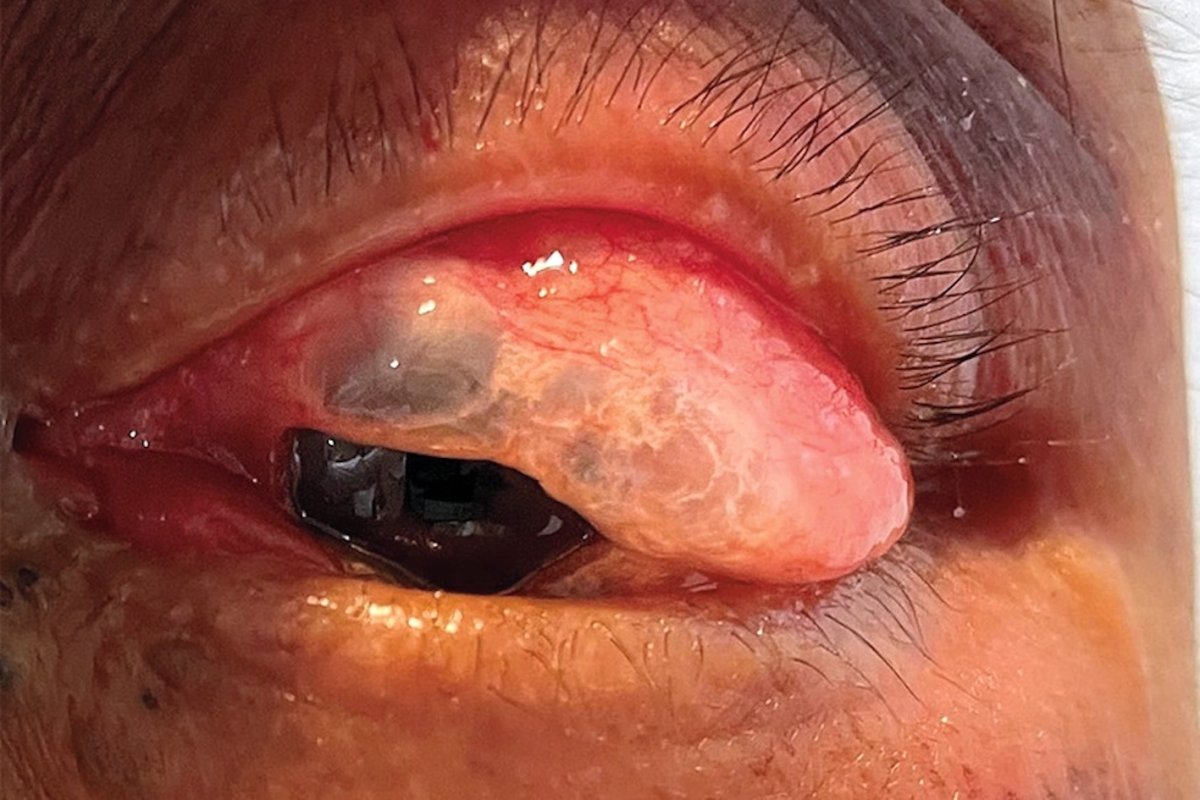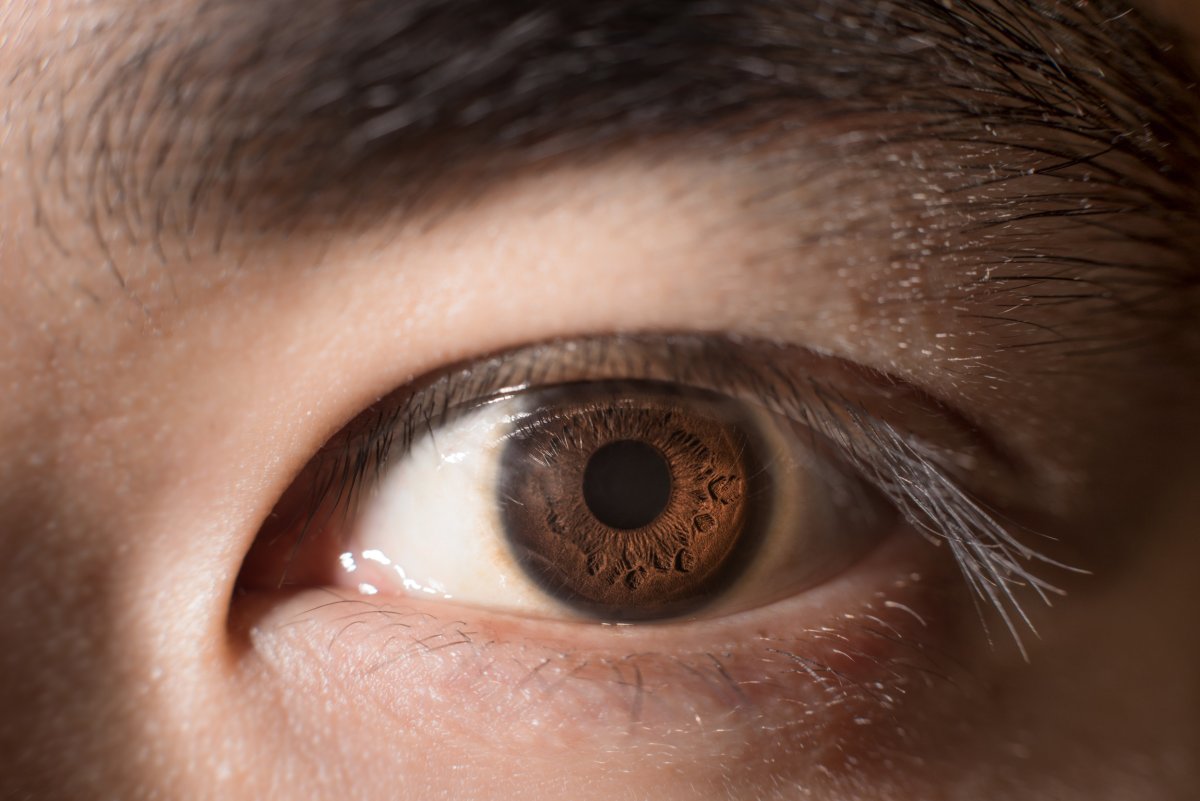A 63-year-old man's left eye took on a bizarre "bubbly appearance" after he fell over and hit his head.
The patient was eventually diagnosed with a condition known as orbital emphysema. This is characterized by air being trapped in the orbital compartment—the cavity of the skull in which the eye is situated.
The "bubbly appearance" is described in an article published in The New England Journal of Medicine. Dr. Nien-Jung Lee, an emergency department physician at Yuan's General Hospital in Taiwan and lead author of the article who treated the patient, told Newsweek the 63-year-old's condition was "quite rare" and that orbital emphysema is associated with a number of risks.
"When air enters and gets trapped in and around the eye, we would be most concerned with how it affects the function, visual acuity and structural integrity of the eye," Lee said. "The risks of blindness, double vision and infection are the chief concerns associated with this diagnosis."
The 63-year-old is a construction worker who tripped and fell while he was at work, with his face striking a concrete floor.
"When he fell, he hit the part of his forehead rather close to his left eye," Lee said.

After the accident, the man started to experience double vision and his left eye developed the bubbly appearance, as can be seen in the above image.
Along with the pain and tenderness felt around the area of impact, there was bruising and swelling of the man's left eye, Lee said.
The man visited the emergency department, where doctors examined him and conducted a CT scan.
These examinations revealed that air had entered the conjunctiva of the man's left eye, led to its bubbly, inflated appearance.
The conjunctiva is the clear membrane that lines the inside of the eyelid and covers the white of the eye. Air was also found in the space between the cavity that houses the eye and the eye itself.
The man had "air tracking almost all the way around and back behind his eyeball," Lee said.
The air most likely gained entry through fractures to the floor of the orbital compartment and the sinus wall that the man suffered in his accident.
The man's symptoms led to disturbances in his left eye vision, although the 63-year-old had been living with poor visual acuity in this eye for two decades prior to the accident, Lee said.
Thus, he had already grown accustomed to seeing out of his right eye. Results of an examination of the right eye were normal.
Doctors treated the man using a technique known as needle decompression. This involves taking a needle and draining the trapped air.
The patient was also prescribed antibiotic eye drops, as well as eye drops that help to lower the eye pressure.

The prompt decompression treatment resulted in an improvement in the man's visual acuity, although it is unclear exactly how his recovery has progressed.
"Since he did not have bleeding in or around the eye, or significant structural damage beyond the superficial layer of his eye, his recovery was supposed to be relatively uneventful," Lee said. "Unfortunately, he did not return for his follow-up ophthalmology appointment as scheduled so we can't say for sure how he's doing now."
Lee said this kind of condition is relatively rare, noting that he had never personally come across it before.
"Among all the patients that come in due to trauma to the face and head in years of our practice, this is the first patient whose traumatic experience actually led to air entry into his eye," he said.
While orbital emphysema is typically benign and usually resolves by itself with time, in some cases, complications can lead to vision impairment.
But whether or not the orbital emphysema actually caused a further impairment in the left eye vision of the 63-year-old man is unclear.
"What we do know is that it caused a transient disturbance in his visual acuity, which improved upon treatment with needle decompression," Lee said. "However, it is not known if his visual acuity remained at the baseline level due to loss of follow-up at the outpatient opthalmology clinic. What contributed to his baseline poor vision was not investigated."
The most frequent cause of orbital emphysema is physical trauma and fracture of one of the orbital bones, which enables the entry of air.
But other causes for the condition have been reported, including infection, injury from compressed air hoses, complications from surgery—including dental procedures—and pulmonary barotrauma.
The latter is a potential diving injury that can result in symptoms such as coughing, shortness of breath, chest pain, choking, changes in voice, hoarseness, difficulty swallowing, and in severe cases, respiratory failure, loss of consciousness, cardiac arrest, and even death.
Pulmonary barotrauma occurs as a result of lung over-expansion when a SCUBA diver returns to the surface without exhaling, or when air becomes trapped in the lung.
Is there a health issue that's worrying you? Do you have a question about any rare conditions? Let us know via health@newsweek.com. We can ask experts for advice, and your story could be featured on Newsweek.
Uncommon Knowledge
Newsweek is committed to challenging conventional wisdom and finding connections in the search for common ground.
Newsweek is committed to challenging conventional wisdom and finding connections in the search for common ground.
About the writer
Aristos is a Newsweek science reporter with the London, U.K., bureau. He reports on science and health topics, including; animal, ... Read more
To read how Newsweek uses AI as a newsroom tool, Click here.








